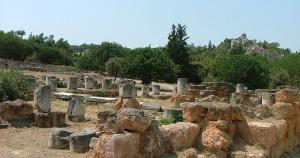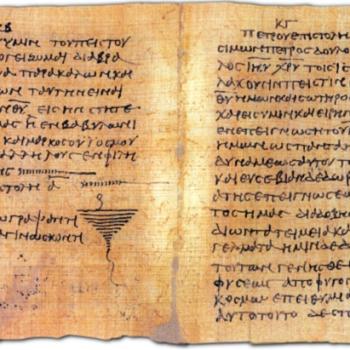The Stoic philosopher Seneca echoes so many of the teachings of Paul that he was about as Christian as a pagan Stoic could get.
Seneca is born in Spain around 4 or 5 BCE, and dies in 65 AD as a victim of the same tyrant who executed Paul. The two men probably know about each other, but we have no evidence that they ever met or corresponded, although there are a handful of probable forgeries of letters exchanged between the two. Let’s take a look at the echoes of Paul in Seneca’s writings.

Throughout his essay On Providence, Seneca talks about God as the loving but stern parent or the demanding army commander who tries to bring out the best in humans through suffering. He writes, “How can I know with what spirit you would confront poverty, when you wallow in wealth?…How do I know how serenely you would handle bereavement when all the children you have raised are present to your sight?…So God hardens, scrutinizes, and disciplines those he approves and loves, but those he appears to indulge and spare, he is only keeping soft for disasters to come.” (Providentia 4.5–7) The similarity here to Hebrews 12:5-11, a non-Pauline passage, is hard to miss.
Seneca has much to say about God and about ethics that sounds almost as if it could have been borrowed from Paul. He preaches about following the gods’ example. (Vita beata 15.7) He says, “Temples are not to be built to God of stones piled on high. He must be consecrated in the heart of each man.” (Fragment 123) Again, “You shall not form him of silver and gold; a true likeness of God cannot be molded of this material.” (Epistle 31:11) Seneca even speaks of “a holy spirit residing in us, the guardian and observer of our good and evil deeds.” (Epistle 41.1)
But as Lightfoot correctly observes, the resemblance to Christian theology is superficial. Seneca, he argues, like other true Stoics, is a pantheist. Seneca’s references to God (singular) are to the god all around and within. He says, “God is near you, with you, inside you.” (Epistle 41:1) To Seneca, God is also another name for Nature: “For what else is Nature but God and the Divine Reason…?” You can call him Jupiter, says Seneca, you can call him Fate, any name that refers to some “force that operates in the domain of heaven” (Beneficiis 4.7.1, 2).
Again, “there is no Nature without God, nor God without Nature, but both are the same thing, they differ only in their function.” (Beneficiis 4.8.2) Again, he speaks of “the great creator of the universe, whoever he may be, whether an all-powerful God, or incorporeal Reason contriving vast works, or divine Spirit pervading all things…or Fate and an unalterable sequence of causes…” (Helvetia 8.3). In one letter, Seneca is not sure “whether Fate binds us down by an inexorable law, or whether God as arbiter of the universe has arranged everything, or whether Chance drives and tosses human affairs,” but whichever it may be, we must “obey God” and/or “endure Chance” (Epistle 16.4, 5, 6).
Seneca’s references to the gods (plural) are to beings who are no better or worse than us: “The only difference between the good man and God is the matter of time,” that is, the gods live longer than humans do (Providentia 1.5; compare Epistle 53.11). “In this you may outstrip God: he is exempt from enduring evil, while you are superior to it.” (Providentia 6.6) In this same essay, Seneca writes that “the same necessity” by which our lives are ruled “also binds the gods. One unchangeable course bears along the affairs of men and gods alike. Although the great creator and ruler of the universe himself wrote the decrees of Fate, yet he follows them. He obeys forever, he decreed but once.” (Providentia 5.8).
And as Lightfoot further observes, Seneca and Tertullian might use the same term peccatum, Seneca and Paul may both say “All have sinned,” but they cannot mean the same. Seneca is not speaking of obedience to a personal God, but accepting whatever hardships the universe bestows on us. “This is the sacred obligation by which we are bound – to submit to the human lot, and not to be disquieted by those things which we have no power to avoid…to obey God is freedom.” (Vita beata 15.6, 7) “It is our aim to live according to Nature, and to follow the example of the gods.” (Ibid.)
In Lightfoot’s opinion, “It appears that Christian parallels in Seneca’s writings become more frequent as he advances in life.” Lightfoot cites de Providentia, de Otio, de Vita beata, de Beneficiis, and the Epistolae Morales as Seneca’s works that most closely resemble Christian belief.
Will we see Seneca in heaven? It all depends on what he did with Jesus at the last. If Jesus had personally met Seneca during his time on earth, I can picture Jesus saying to him, “You are not far from the kingdom of God.”















